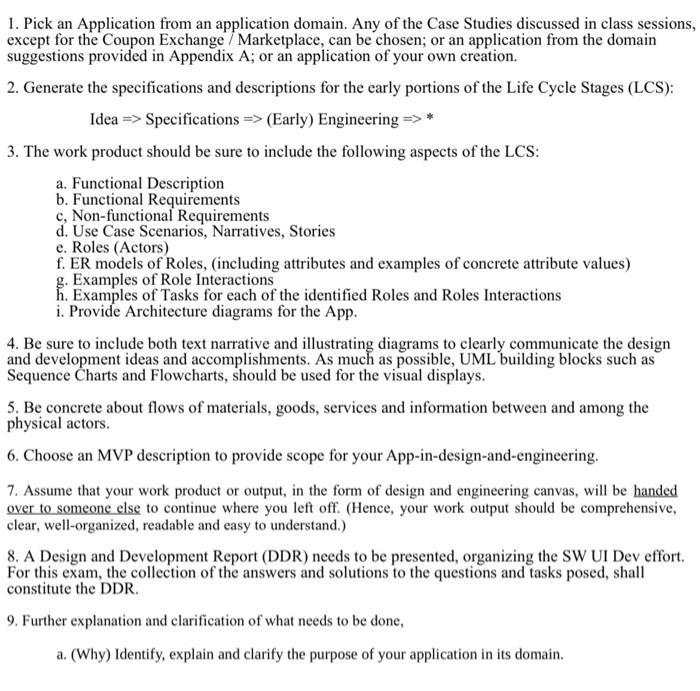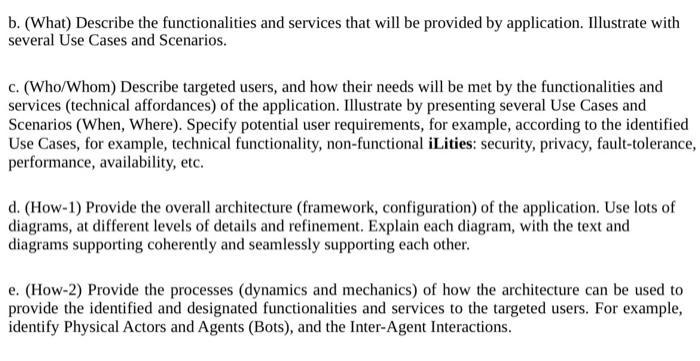Answered step by step
Verified Expert Solution
Question
1 Approved Answer
1. Pick an Application from an application domain. Any of the Case Studies discussed in class sessions, except for the Coupon Exchange / Marketplace,


1. Pick an Application from an application domain. Any of the Case Studies discussed in class sessions, except for the Coupon Exchange / Marketplace, can be chosen; or an application from the domain suggestions provided in Appendix A; or an application of your own creation. 2. Generate the specifications and descriptions for the early portions of the Life Cycle Stages (LCS): Idea => Specifications => (Early) Engineering => 3. The work product should be sure to include the following aspects of the LCS: a. Functional Description b. Functional Requirements c, Non-functional Requirements d. Use Case Scenarios, Narratives, Stories e. Roles (Actors) f. ER models of Roles, (including attributes and examples of concrete attribute values) g. Examples of Role Interactions h. Examples of Tasks for each of the identified Roles and Roles Interactions i. Provide Architecture diagrams for the App. 4. Be sure to include both text narrative and illustrating diagrams to clearly communicate the design and development ideas and accomplishments. As much as possible, UML building blocks such as Sequence Charts and Flowcharts, should be used for the visual displays. 5. Be concrete about flows of materials, goods, services and information between and among the physical actors. 6. Choose an MVP description to provide scope for your App-in-design-and-engineering. 7. Assume that your work product or output, in the form of design and engineering canvas, will be handed over to someone else to continue where you left off. (Hence, your work output should be comprehensive, clear, well-organized, readable and easy to understand.) 8. A Design and Development Report (DDR) needs to be presented, organizing the SW UI Dev effort. For this exam, the collection of the answers and solutions to the questions and tasks posed, shall constitute the DDR. 9. Further explanation and clarification of what needs to be done, a. (Why) Identify, explain and clarify the purpose of your application in its domain. b. (What) Describe the functionalities and services that will be provided by application. Illustrate with several Use Cases and Scenarios. c. (Who/Whom) Describe targeted users, and how their needs will be met by the functionalities and services (technical affordances) of the application. Illustrate by presenting several Use Cases and Scenarios (When, Where). Specify potential user requirements, for example, according to the identified Use Cases, for example, technical functionality, non-functional iLities: security, privacy, fault-tolerance, performance, availability, etc. d. (How-1) Provide the overall architecture (framework, configuration) of the application. Use lots of diagrams, at different levels of details and refinement. Explain each diagram, with the text and diagrams supporting coherently and seamlessly supporting each other. e. (How-2) Provide the processes (dynamics and mechanics) of how the architecture can be used to provide the identified and designated functionalities and services to the targeted users. For example, identify Physical Actors and Agents (Bots), and the Inter-Agent Interactions.
Step by Step Solution
★★★★★
3.59 Rating (170 Votes )
There are 3 Steps involved in it
Step: 1
Application Domain Online Education Platform 1 Purpose The online education platform aims to provide a flexible and accessible learning environment for students of all ages and backgrounds It seeks to ...
Get Instant Access to Expert-Tailored Solutions
See step-by-step solutions with expert insights and AI powered tools for academic success
Step: 2

Step: 3

Ace Your Homework with AI
Get the answers you need in no time with our AI-driven, step-by-step assistance
Get Started


